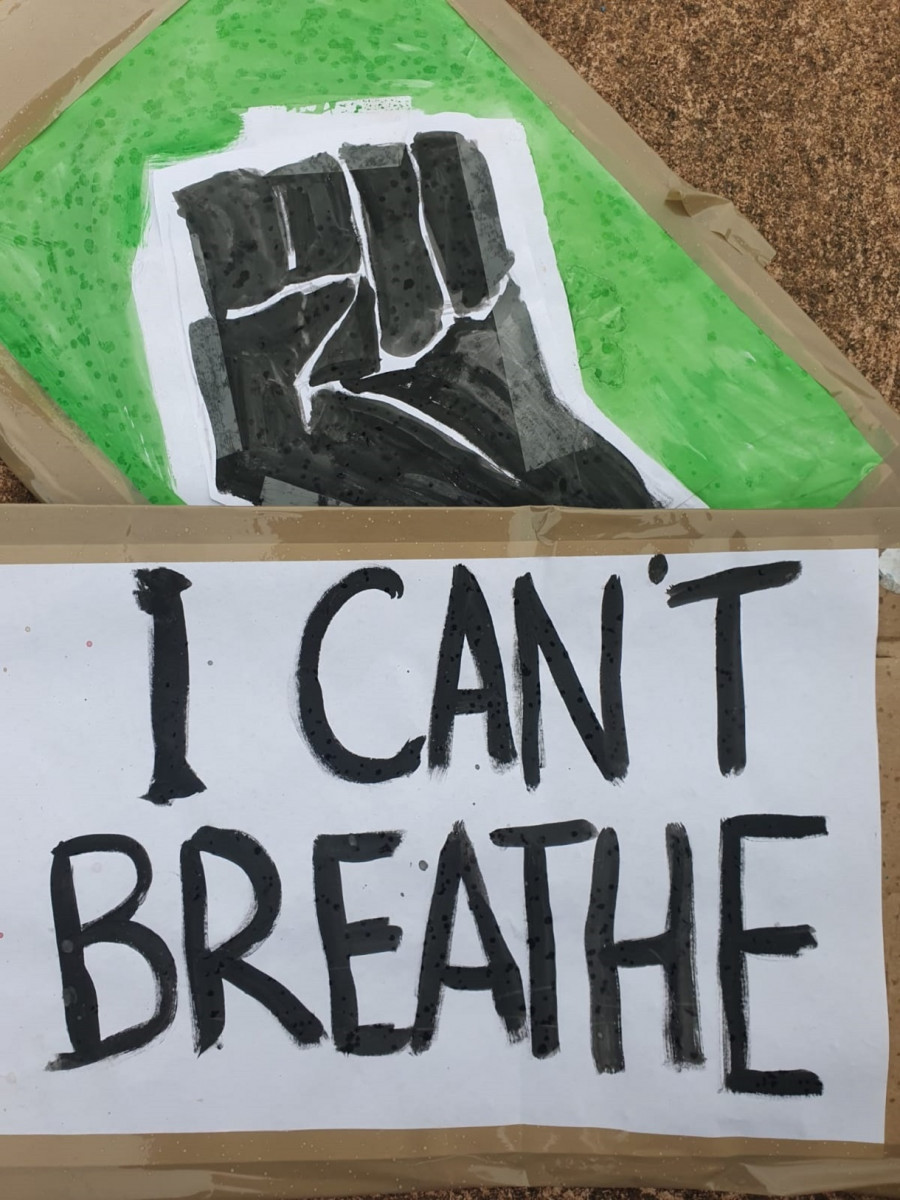Time to reflect?
churchadmin2020-08-29T14:04:25+01:00‘Time’ to look up again! Our clock mechanism is back and keeping perfect time.
The clock was originally installed in Holy Rood Church, on the Lawn, in 1843 and has been in the Christ Church clock tower since 1851. Its repair was made possible by legacies left to the charity Friends of Christ Church. We thank the Friends for all that they do. To find out more about the Friends of Christ Church, go to: https://www.christchurchswindon.co.uk/friends.php
(more…)Black Lives Matter
churchadmin2020-08-29T14:57:36+01:00A personal perspective
The events that have unfolded since George Floyd’s very public killing has caused me to catch my breath, pause — pause, and exhale.

As a writer I often find myself penning a poem to process my thoughts and feelings in response to confronting issues. The rawness of my poetry at this time reflects the place of pause I find myself in as I catch my breath.
But in writing these poems, I realise that not a thousand words nor a single word can fully articulate my strength of emotion. Like a wound that is constantly scabbed in my day-to-day lived experiences, the reality of life as a black woman is magnified again and again when public events like the George Floyd case occur.
As a person of colour, I’ve experienced a range of emotions in the last few weeks: tired, crushed, angry, frustrated, bewildered. My parents lived with racial injustice. I live with racial injustice. And, if things don’t change, my daughter’s generation will live with racial injustice.
It’s incredible that, in 2020, we still witness persecution and aggression against people of colour. Black and brown skinned people have endured decades of injustices. In recent history we note: the deaths of Stephen Lawrence and Mark Duggan (among countless others), the Grenfell Tower disaster, the Windrush scandal, an increase in knife crimes among black youths, and the higher impact of Covid-19 deaths on key workers from BAME backgrounds. How many more black and brown lives have to be lost before we work together – black, brown, and white – to see a real change in society?
(more…)Not back to normal – planning for a better future
churchadmin2020-06-06T16:03:12+01:00
Martin explored the theological, environmental and community challenges which the pandemic is raising in our own country and across the world. He stresses the importance of joining together as faiths to practically respond to the social and economic challenges, within an anxious and ever-changing environment.
Watch the recording
Watch Martin Palmer’s Talk Not back to normal – planning for a better future
churchadmin2020-05-29T14:54:45+01:00We will meet
churchadmin2020-08-27T19:56:34+01:00Listen to this new song by John Bell from the Iona Community which sums up all our hopes for the future.
Click to play: We will meet

I Can’t breath
churchadmin2020-08-27T19:51:26+01:00Rage rises
tongues of flame
sear bones, sinew and muscle
wrapped in brown skin
limbs writhe against batons
lips swell with beatings
eyes bleed, jaw cracks
wrapped in brown skin
shackled. starved. raped.
gouged. hunted. choked.
lynched. poked. injected.
stripped. drowned. expelled.
trampled. airbrushed. kneed.
medicated. gassed. gunned
down
down
down
years of white knuckles and heels
kick up dust clouds
in cotton fields, ghettos, tower blocks
brown skin burns,
turns flesh to dust dust dust
fills nostrils, clogs windpipes
Until
I can’t breathe
By: Revd Dr Catherine Okoronkwo
Good News for Swindon Prayer night Tuesday 12 May at 8 pm – 9 pm.
churchadmin2020-05-16T13:41:55+01:00The event will be hosted using zoom. Contact Simon or one of the staff team for details if you would like to join in
The plan for the evening is as follows:
1. Welcome by Tom Price – 8 pm
2. Focus on the government and our frontline care workers – introduction (3 minutes) by John Edmonds – Freshbrook Church, followed by 12 minutes of prayer in our zoom groups
3. Focus on renewal, revival, and outreach– introduction (3 minutes) by Colin Thornton – Gateway Church, followed by 12 minutes of prayer in our zoom groups.
4. Focus on Young people – introduction (3 minutes) by Dave Clarke SYFC – followed by 12 minutes of worship in our zoom groups.
5. Focus on our families/church – introduction (3 minutes) by Tom Price – Discovery Church, followed by 12 minutes of prayer in our zoom groups.
6. Finish at 9.05 pm with a closing prayer
The way it will work is that you’ll be added to the entire group as you sign in and see lots of people. Once the introduction has been covered for each area, you’ll be assigned to a group of up to 4 others, and we want to encourage you to say a quick hello to one another and then spend the 12 minutes we’ve allocated praying together for the needs highlighted. You’ll then be brought back to the main screen for another 3-minute intro etc.
Please feel free to invite any Christians you know in Swindon and the surrounding area to join us that evening. We want to make it a time of real earnest prayer for our town and our nation as well as our own lives. If you would like to participate, please contact Simon or one of the staff team (staffteam@christchurchswindon.co.uk)
This virtual gathering is a meaningful way for us to join in these difficult times and encourage one another in prayer. We can accommodate up to 500 users, so feel free to join as a couple, an individual or as a family.
24 Hour Free Phone line
churchadmin2020-05-16T23:10:06+01:00The Archbishop of Canterbury, Justin Welby, has launched a FREE national ‘phone line as a simple new way to bring worship and prayer into peoples’ homes whilst church buildings are closed.
Daily Hope offers music, prayers and reflections as well as full worship services from the Church of England at the end of the telephone line. The 24 hour a day line is particularly helpful for those unable to join online church services;
The free ‘phone number is: 0800 804 8044
Why our Church is still closed
churchadmin2020-05-09T15:20:10+01:00Archbishop Welby has produced a useful video explaining the church policy on the closure of our Church buildings.
Some Prayer Resources
churchadmin2020-08-29T13:42:32+01:00Here are some helpful resources to help you to deepen your prayer life at home. Do let us know how we can be praying and supporting you.
“To pray is to make our hearts ready to experience the love of God in Jesus Christ through the power of the Holy Spirit. Praying regularly will help us to develop a spiritual rhythm. A discipline of prayer changes the way that we think about our lives, because it creates new habits of heart and mind. Prayer opens us more deeply to the transforming grace of God. We enter into God’s presence, allowing the Holy Spirit to pray in us”
Taken from the Church of England website:-
https://www.churchofengland.org/prayer-and-worship/learning-pray
You can download all the prayer suggestions below
Taize Prayer
The Taize brothers have divided their household into 8 units. Every evening at 7.30pm they invite us to join a few of them in their home for the evening prayer. It lasts around 40 minutes. You can see the videos anytime, and if you wish to, read the messages and prayers pouring in from all over the world as people join in. But above all it is an opportunity to focus on God and join in prayer at a time of day when we may be feeling anxious or tired.
Go to http://www.taize.fr/en_article27540.html and click the link on the site.
Or you can listen via their Facebook page.
The Ignatian Method of Prayer
is to project oneself back into the Biblical scene and to become a part of it by way of imagination. Ignatius suggests that we try to imagine what we might see, what we might hear, and what the persons in the scene might be doing. What changes or challenges does our reflection on the event bring us?
1. (John 21:1-19) Imagine that you are Peter. Read the story very carefully so that you will remember all of the details. Then close your eyes and re-live the scene in your imagination. Try to capture your feelings when Jesus asks you three times, “Do you love me?” Then answer the way
you would want to answer rather than merely repeat what Peter said. When Jesus tells you:
“Follow me,” try to imagine what that might mean in the immediate future of your present life.
2. (Luke 10:25-37) Read the parable of the Good Samaritan and try to imagine yourself, first of all,as the priest who passes by on the other side of the road. What reasons could you give for refusing to get involved? Then try to imagine yourself as the person who fell among the robbers and who was left half-dead by the side of the road. What might you think as you see people pass you by and refuse your cries for help? Thirdly, imagine yourself as the Good Samaritan. Try to envision some situations today where you could act as a Good Samaritan to others in trouble.
- (Mark 9:14-29) Read the story. Imagine yourself as the father of the possessed boy and apply the conversation between Jesus and the father to your own situation. Instead of an afflicted son,
imagine the affliction is some fault of yours which has resisted cure. Bring this affliction to Jesus and ask him to cure it. - (Luke 7:36-50) Imagine yourself as the penitent woman who comes to Jesus in the house of
Simon the Pharisee, washes his feet with her tears, and dries them with her hair. Try to imagine
why you should be weeping and how you came to be convinced that Jesus would understand and show mercy. Imagine your reaction when you hear him saying to you, “Many sins are forgiven you
because you have loved much.”
Austinian Prayer methods
The Augustinian Method is to transpose the Biblical account onto our situation today. In Augustinian prayer, we try to think of the words of the Bible as though they were a personal letter from God addressed to each one of us.
1.(Matthew 5:38-48) Read the passage slowly several times. Try to discern what meaning the words might have if spoken by Jesus to you at this very moment. Whom do you need to forgive? How might Jesus be asking you today to turn the other cheek, to go the extra mile, to give away your shirt as well as your cloak? Feel free to apply these words of Jesus to some other area of life besides material possessions.
2.(Philippians 3:7-16) Put yourself in the place of a person in Philippi who received this letter from Paul. He is writing with you specifically in mind. He knows your situation quite well. How do the words apply to you?
3.Isaiah 58:2-14) Justice and charity to the poor are the most authentic forms of fasting. How far can these words of God apply to your life? What more can you do to share your bread with the hungry, shelter the oppressed and the homeless, clothe the naked? Try to imagine God saying these words to you today. What is He asking of you at this time in your life?
4.(Micah 6:8) “You have been told, 0 man, what is good and what the Lord requires of you: Do right, love goodness, and walk humbly with your God.” Consider how these three requests sum up your relationship with God and your fellow human beings. Imagine God speaking these words to you. Close your eyes and repeat them slowly over and over again. Try to apply them to your own situation. What is God asking of you?
A GROUP OF FRANCISCAN TYPE PRAYER SUGGESTIONS
The Franciscan Prayer makes full use of the senses to be open to God. There may be a strong feeling of praying through work or service of others.
- Read Daniel 3:26-90 [The Prayer of Azariah vs 29-68 in the Apocrypha]. Spend the remainder of the half hour composing your own canticle of praise of God for all the beauties of His creation. include the beauties of the inner world of the Spirit, of one’s own nature, of friends, as well as of the physical world.
- Think of the person in the world that you love the most. Ask yourself the following question: How can I see the presence of God in that person? Spend some time praising and thanking God for giving so much goodness, beauty, grace, etc. to that person. Spend some time thanki ng God for the gift of love whereby you are able to love that person and that person is able to love you.
- Think of the person that you least like of all your acquaintances. Try to see something of God’s goodness, love, life, truth, beauty in that person. What might you do to foster and increase the presence of God in that person? Prayer is always a way to help another.
- Go outside; look for two trees: one which resembles the kind of person you would like to be or your goal in life, another which expresses in some way the kind of person you see yourself to be now. Decide what you need to do in order to change from the way you now are to the way you would like to be or the way God would like you to be.
A GROUP OF THOMISTIC TYPE PRAYER SUGGESTIONS
Thomistic Prayer pays close attention to the rational process of thinking needed to attain an appropriate conclusion. It emphasises the doctrinal aspects of faith and moves towards the practical outworking of it in
daily life.
- (Mark 8:34-38) Doctrine of the Cross. What does Jesus mean when he insists that in order to be his disciple we must take up our cross and follow him? What are the cro sses in your present life? Are you carrying them in the same way that Jesus carried his cross to Calvary? What do you need to change in your present attitude toward your crosses?
- (Matthew 10:39) “He who seeks only himself brings himself to ruin; whereas he who brings himself to nought for my sake discovers who he really is.” What does Jesus mean by the words “bring oneself to
nought for my sake”? What do you need to do in your life to put Jesus’ concerns ahead of your own? How does self-discipline enable us to “discover who we really are”? Just who are we really? What is our primary purpose on earth? Is it to satisfy ourselves or to fulfil some God-given destiny? What is the ministry God is asking of us? - (Matthew 5:20-26 and John 2:13-17) What is the difference between the anger of Jesus and the anger which Jesus condemns in this passage from Matthew? Why is anger so wrong that Jesus equates it with the command against killing? St. Thomas defines anger as the desire to attack violently anyone who poses a threat to something we consider valuable. What about self-defence of our country, our family, ourselves?
How far are we justified to go to defend ourselves? Is the anger you sometimes feel a justifiable anger, similar to that of Jesus, or the kind of anger Jesus condemns in the Sermon on the Mount? What does one do about one’s anger? - (Matthew 6:26-34) Study carefully each verse of Jesus’ teaching about Divine Providence. With what of it do you agree? What do you consider not applicable to your present way of life? What justification can you make for the verses you are unwilling to accept literally? What changes do you need to make in your life in
order to follow Christ’s teachings here?


